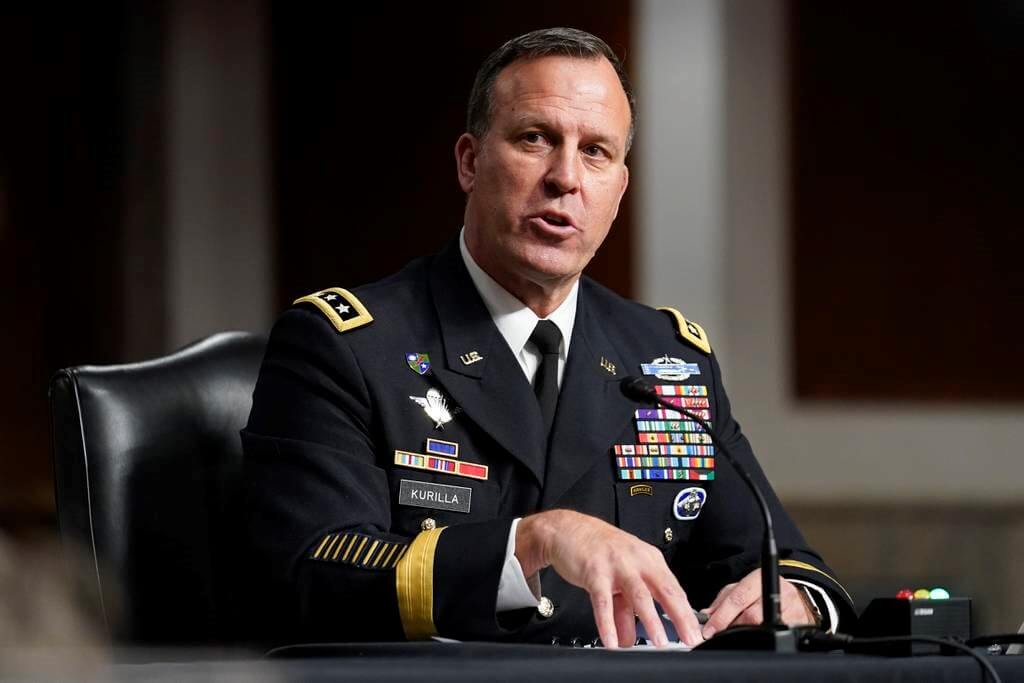On Thursday, US General Michael Kurilla said that he was “very, very concerned” that a potential Turkish incursion into Syria could cause Syrian Defense Forces (SDF) to be called from guarding prisons, risking the escape of thousands of Islamic State detainees and destabilising the region.
Addressing whether a “possible Turkish intervention in Syria” would affect US’ capabilities of combating ISIS, Kurilla said that 28 prisons across northern Syria would be at risk under a Turkish invasion. “If you remember […] in January of last year, there was a breakout of almost 4,000 ISIS detainees. It also can put at risk the security down at al-Hol Camp,” Kurilla added.
Kurilla further noted that although he thinks that ISIS’ territorial areas have been taken away, “the ideology remains unconstrained and uncontained,” and the ‘Defeat ISIS’ operations in Syria must be continued.
These comments come just over a month after the Pentagon released a statement saying that Turkish airstrikes in northern Syria threatened “Defeat ISIS’s years-long progress to degrade and defeat ISIS,” and “the safety of U.S. personnel who are working in Syria with local partners to defeat ISIS and maintain custody of more than ten thousand ISIS detainees.” In this respect, Kurilla called for “immediate de-escalation” of Turkish airstrikes in Iraq and Syria.
US Central Command chief Gen. Michael Kurilla says he is very concerned over a possible Turkish incursion because it "can destablize the region."
— Wladimir (@vvanwilgenburg) December 22, 2022
The Turkish airstrikes in Syria, part of Operation Claw Sword, took place in response to the alleged involvement of the People’s Defensive Units (YPG) and the Kurdistan Workers’ Party (PKK) in the explosion in Istanbul that killed at least 6 people and injured 81 on November 13. Following the explosion, Turkish Interior Minister Süleyman Soylu rejected the condolences of the US Embassy, saying the US was responsible for this tragedy owing to its support for groups like YPG.
Following the start of the airstrikes, Kurdish militants launched rockets into the Turkish district of Karkamış in the Gaziantep province, killing three civilians and injuring six. Shortly after, Ankara claimed that 254 Kurdish militants had been killed via airstrikes over the course of Operation Claw Sword. The seemingly endless attacks and counter-attacks from both sides have led to several casualties over the years, including innocent civilians, and derailed efforts to contain the ISIS threat in the region.
Despite the warnings from the US, Turkey is currently in talks with Russia to use the airspace above northern Syria to launch a cross-border operation against Syrian Kurdish militants who are part of the YPG. “We are in talks and discussing with Russia about all issues including opening the airspace,” said Turkish Defence Minister Hulusi Akar on Saturday.
However, while Moscow recognises Ankara’s security concerns as legitimate, the Kremlin spokesman Dmitry Peskov has urged Turkey to avoid taking measures “that could lead to the destabilisation of the overall situation.”
Turkey’s 30km “Buffer Zone” is designed to ethnically cleanse Kurds & other ethnic & religious minority groups from the Turkish border area. Turkey first floated the idea of a Buffer Zone in 2011, & each of its operations in Syria aims to seize more land toward toward this goal. https://t.co/t0qEeUplwL
— Jarrod Morris (@jarrodjmorris) December 25, 2022
Turkey has launched several incursions into northern Syria since 2016 in a bid to eliminate Kurdish militant presence. Since then, it has launched three major operations in the area carved out by the Kurds, collectively known as Rojava, following the Syrian civil war.
It launched Operation Euphrates Shield in 2016 to push YPG fighters out of Afrin and Manbij. The following year, Turkish forces and Syrian proxies conducted a major offensive in Afrin called Operation Olive Branch. In 2019, Turkey, along with its Syrian allies, launched a major offensive into northeast Syria—known as Operation Peace Spring—against Kurdish militants in Ras al-Ain and Tal Abyad.
Additionally, Turkey has refused to accept Finland and Sweden’s bids to join the North Atlantic Treaty Organization (NATO) following Russia’s invasion of Ukraine, citing the Nordic countries’ support for Kurdish militants and failure to extradite these militants to Turkey.

